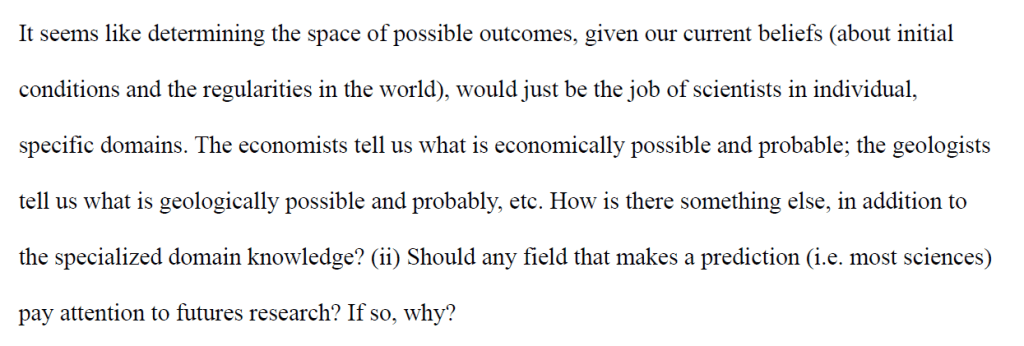A quote from a review report:

This is how philosophers of science understand futures research. I get the same criticism about the field as such every time I write to PoS journal. Some thoughts:
Yes, surely scientists in a domain can and do study possible outcomes in that domain. However, understanding the futures of interesting human phenomena it far from this type of project.
First, there is the question of who, exactly, makes the scenarios in any field. An individual scientist? Some scientific institution? Science as an abstract agency? Whose ideas are used to tell the futures affects what is said – remember that scientists in any domain have disagreements. Science is not a computer program where some abstract calculations are made from a clear set of initial conditions and regularities.
Second, it is far from clear what our initial condition in many phenomena currently are. There are significant disagreements about the state of the current world. For example, the current geopolitical landscape is a subject of much debate. Some analysts argue that we’re witnessing a shift in global power dynamics, with emerging economies like China and India gaining influence. Others believe the U.S. and its traditional allies maintain significant sway. The war in Ukraine obscures all this. This disagreement over the “initial condition” of geopolitics makes predicting future political trends and power balances particularly challenging. A major step towards understanding the futures is to try to figure out what the initial conditions are. This information is far from given, unlike suggested in the passage.
Third, there are no clear “stock” of regularities that can be used to estimate where the future takes us. Understanding complex phenomena in human world require that we use several regularities together. This is difficult in itself but becomes even more challenging once we realize that the regularities can be made to work together only after deeply assessing their mutual compatibility and their ranges of invariance. Such task is beyond any individual scientist or scientific field. Which field could determine the consequences of climate change for human societies?
Fourth, sciences are historical phenomena, and what they study and how they study it are shaped by historical trajectories. It is quite likely that several crucial issues in contemporary world do not fall in the domain of any individual science. This is indicated by the pushes towards interdisciplinary in facing the global challenges. Perhaps this interdisciplinary studies lead to approaches where the futures of the phenomena can be understood on the basis of “regularities and initial conditions” but this is something that only the future can tell. Certainly it is not the case that we can understand the futures by looking at individual sciences and simply summing up their conclusions.
Very proud to be a student at the Faculty of Mathematics and Computer Science, University of M’sila.